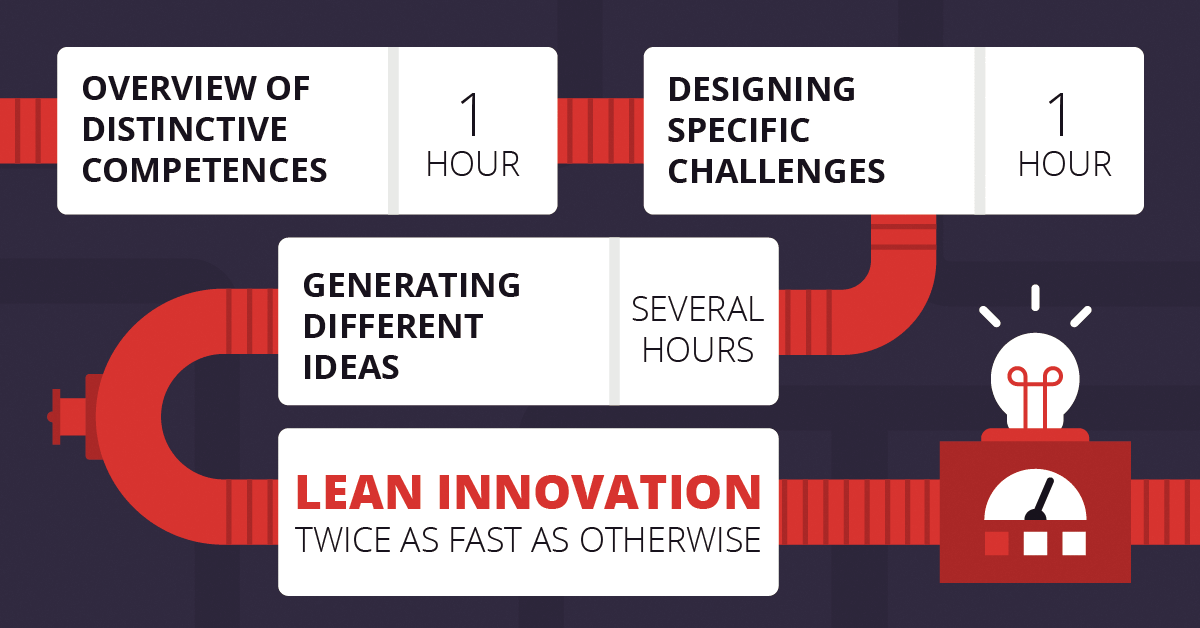
April 19
You can invite even your competition
You can invite your own (key) staff as well as customers, suppliers and other partners, sometimes even your competition, to solve innovation challenges. Participation should be voluntary in any case. The less formal you are, the more innovative will be the suggestions that you get. This is why detailed planning has a truly small value in this phase. First think about the “why” and the “what” and only then about the “how”.

Challenges
Challenges should come from competitive advantages, that is from resources that the competition doesn't have, such as patents, technologies, infrastructure, specific knowledge and experience, special sales channels, brand ...
Examples of challenges
Challenges should be specific and address problems that are worth solving and worthy of your organization. We're listing three examples:
Who is ready for a challenge?
Relatively few individuals, those who love to learn and change things, are capable of solving challenges. These characteristics don't depend on the position or education, and definitely not on gender. The ability to innovate lies in the internal attitude of the individual, often connected to the level of uncertainty with which the individual can live and work.
Motivation
Thinking, innovative people usually have a lot of internal motivation for creating better and worthier things. For many of them, it’s enough that they have permission to tackle good challenges for a certain number of hours during their working day.
A small change with a great impact
What means a lot to these individuals is status and the fact that they're a part of a special group of people that's creating the future of the company. Even a little change in their title – for example Idea Manager or Innovation Manager or member of the team 2010 – can bring a lot of pride, more enthusiasm and definitely focus. For them, money is usually only a tool.
Empowerment
Entrepreneurial people don't wait for instructions, they know how to keep themselves busy. When looking for new business models, it's good to separate these individuals from the company bureaucracy, short-term economic indicators and conservative streams.
Needs and rewards
What they need is fast access to internal sponsors and leaders as well as open and constructive communication. We compensate for the responsibility they've taken over with different combinations of financial, non-financial and symbolic rewards.
Don’t lose a valuable co-worker!
Much like an athlete is persistently looking for opportunities to do sports, creative people tirelessly look for opportunities to innovate, create. Why wouldn't you offer it to them in the parent company? If you can't guarantee that to them, you can lose a potentially very valuable co-worker!
Into politics or the army for power and authority
For the end of this article, a thought by Phil Libin, chief of the famous Evernote Corporation. “People have this vision of being the CEO of a company they started and being on top of the pyramid. Some people are motivated by that, but that’s not at all what it’s like. What it’s really like: everyone else is your boss – all of your employees, customers, partners, users, media are your boss. I’ve never had more bosses and needed to account for more people today. The life of most CEOs is reporting to everyone else, at least that’s what it feels like to me and most CEOs I know. If you want to exercise power and authority over people, join the military or go into politics. Don’t be an entrepreneur.”
Lojze Bertoncelj, MSc, 30Lean, dr. Alexis Zrimec, Abelium, prof. dr. Miroslav Rebernik and Matej Rus, MSc (Faculty of Business and Economics, University of Maribor, and Venture Factory, Initiative Start:up Slovenia).
Photo: Siniša Kanižaj, ABC Accelerator
Management should challenge, motivate and enable! (2/4)
It’s difficult to order innovations, we can only make sure they happen. What's important are ambition and management vision as well as a quick beginning. You only need a few hours for formulating the first version of the innovation challenge. We are revealing how to tackle it in this second article from a series of articles created under the umbrella of the PODIM Conference and its activities and tools for improving breakthrough entrepreneurial activities of big established companies.You can invite even your competition
You can invite your own (key) staff as well as customers, suppliers and other partners, sometimes even your competition, to solve innovation challenges. Participation should be voluntary in any case. The less formal you are, the more innovative will be the suggestions that you get. This is why detailed planning has a truly small value in this phase. First think about the “why” and the “what” and only then about the “how”.

Challenges
Challenges should come from competitive advantages, that is from resources that the competition doesn't have, such as patents, technologies, infrastructure, specific knowledge and experience, special sales channels, brand ...
Examples of challenges
Challenges should be specific and address problems that are worth solving and worthy of your organization. We're listing three examples:
- We wish to keep a hundred jobs, linked to the xy technology? The team who's looking for a new solution has three people, you have free Fridays and weekends, six weeks of time and all essential material costs covered.
- We're looking for significantly better solutions that would suit the problems that older people have with food or transfer or banking ... Take two weeks of time and brainstorm and verify a few concepts.
- Our customers are also young people who are more receptive to new technologies, such as augmented or virtual reality. What will be the sought-after user experiences of the new generation of young clients in the year 2020?
Who is ready for a challenge?
Relatively few individuals, those who love to learn and change things, are capable of solving challenges. These characteristics don't depend on the position or education, and definitely not on gender. The ability to innovate lies in the internal attitude of the individual, often connected to the level of uncertainty with which the individual can live and work.
Motivation
Thinking, innovative people usually have a lot of internal motivation for creating better and worthier things. For many of them, it’s enough that they have permission to tackle good challenges for a certain number of hours during their working day.
A small change with a great impact
What means a lot to these individuals is status and the fact that they're a part of a special group of people that's creating the future of the company. Even a little change in their title – for example Idea Manager or Innovation Manager or member of the team 2010 – can bring a lot of pride, more enthusiasm and definitely focus. For them, money is usually only a tool.
Empowerment
Entrepreneurial people don't wait for instructions, they know how to keep themselves busy. When looking for new business models, it's good to separate these individuals from the company bureaucracy, short-term economic indicators and conservative streams.
Needs and rewards
What they need is fast access to internal sponsors and leaders as well as open and constructive communication. We compensate for the responsibility they've taken over with different combinations of financial, non-financial and symbolic rewards.
Don’t lose a valuable co-worker!
Much like an athlete is persistently looking for opportunities to do sports, creative people tirelessly look for opportunities to innovate, create. Why wouldn't you offer it to them in the parent company? If you can't guarantee that to them, you can lose a potentially very valuable co-worker!
Into politics or the army for power and authority
For the end of this article, a thought by Phil Libin, chief of the famous Evernote Corporation. “People have this vision of being the CEO of a company they started and being on top of the pyramid. Some people are motivated by that, but that’s not at all what it’s like. What it’s really like: everyone else is your boss – all of your employees, customers, partners, users, media are your boss. I’ve never had more bosses and needed to account for more people today. The life of most CEOs is reporting to everyone else, at least that’s what it feels like to me and most CEOs I know. If you want to exercise power and authority over people, join the military or go into politics. Don’t be an entrepreneur.”
Lojze Bertoncelj, MSc, 30Lean, dr. Alexis Zrimec, Abelium, prof. dr. Miroslav Rebernik and Matej Rus, MSc (Faculty of Business and Economics, University of Maribor, and Venture Factory, Initiative Start:up Slovenia).
Photo: Siniša Kanižaj, ABC Accelerator
- - - - - - - - - - - - - - - - - - - - - - - - - - - - - -
For more guidelines and real-life experience on how to effectively develop and innovate in established companies, the best way to take advantage of this year's PODIM Conference is to decide for the PODIM PRO package.
- - - - - - - - - - - - - - - - - - - - - - - - - - - - - -
For more guidelines and real-life experience on how to effectively develop and innovate in established companies, the best way to take advantage of this year's PODIM Conference is to decide for the PODIM PRO package.
- - - - - - - - - - - - - - - - - - - - - - - - - - - - - -
Together, we are trying to spread best practices of the lean startup way of developing new business models, and simultaneously connect established experienced managers with innovative startup entrepreneurs:
- The Managers' Association of Slovenia, helping managers deal with challenges of implementing digital changes whose tempo is dictated by rapid, lean and innovative startup companies with their disruptive digital products and services.
- Initiative Start:up Slovenia as the provider of key national programmes for startups and connector of public and private stakeholders of the Slovenian startup ecosystem, summarizing its activities every year at the PODIM Conference.
- Business daily Finance with the media project Startupozavri or Startuposauruses, in which they highlight startup freshness in established Slovenian companies and thus contribute to healthy development of entrepreneurial spirit in the Slovenian society.
- 30Lean as an established consultant and mentor of lean innovation in already established organizations, mentor of startup teams of the Slovene Enterprise Fund, ABC Accelerator and others, and the leading partner of the Slovenia Running Lean movement.
Our first joint activities include gathering and sharing these types of good and bad experiences, and co-creating PODIM Conference content for established companies.






